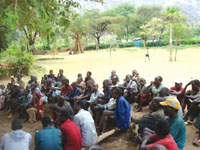2.1.2 Groups
Groups are gatherings of two or more people with a common interest; they are a good target for your health education sessions (Figure 2.2). To understand the concept of group health education, imagine that there is a gathering of an HIV/AIDS peer educator group at the local secondary school. You may well be invited by the school administrator to deliver health messages on HIV/AIDS to help train groups such as these.

Look at the list below. What type of health education activity is each of these? Are they individual or group? When you have done this spend a few minutes thinking about the balance between group work and individual work that a Health Extension Practitioner should try to achieve. Which aspects of group work or individual work do you think you will enjoy most?
- a.A family planning service for a couple
- b.A school club about HIV/AIDS
- c.A gathering of mothers about breast feeding their children
- d.Class students learning about hygiene and sanitation
- e.Factory workers understanding about occupational health hazards
- f.Counselling of a pregnant mother about issues relating to her pregnancy.
Except for activity (f) which is individual in all the above are examples of group health education activities. As a Health Extension Practitioner you may well become involved in all of these or similar activities. Notice too though that all of these activities (a) to (e) might at some point be done with individuals. There is no fixed rule about what is a group activity and what is individual activity.
2.1.1 Individuals
